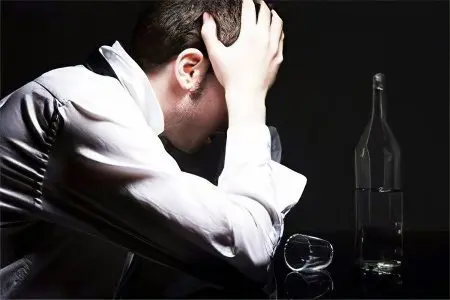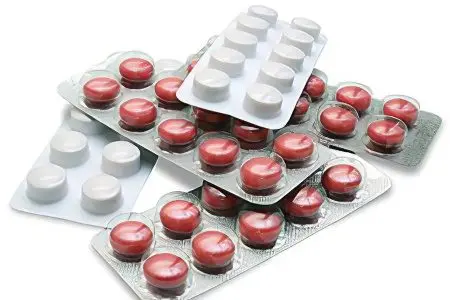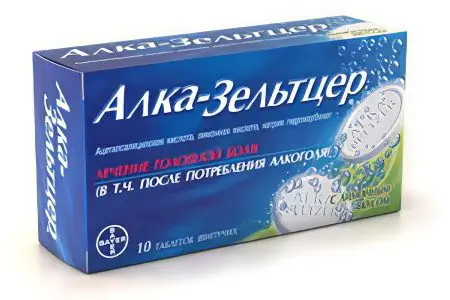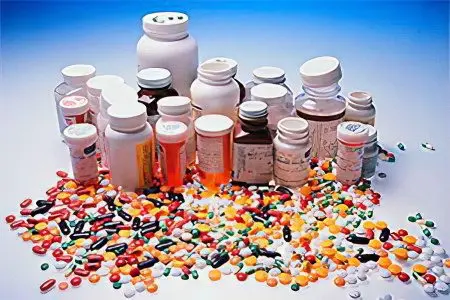Contents
- Why does addiction occur?
- Three steps into the abyss
- Drugs for the treatment of alcoholism
- Alcohol aversion pills
- Alcohol craving pills
- hangover pills
- Tablets that neutralize the effects of alcohol
- Pills for the treatment of alcoholic mental disorders
- Pills for the treatment of alcoholism without the knowledge of the patient
It is customary among the people to consider alcoholism as something like a vice, and people suffering from alcohol addiction are lost weaklings with a low moral character, on whom it is a pity to waste time. Therefore, when such a problem arises in a family, an explanation is immediately found (“everyone in his family is like that”), and then a solution (“leave it before he breaks your life”). Of course, there are selfless and devoted spouses who stay around and try to wrest their soul mate from the clutches of the green snake, but most of them directly or implicitly blame the alcoholic for being like that.
Meanwhile, alcoholism is the same disease as sciatica or diabetes. There is a predisposition to it, it has a mechanism of occurrence and stages of development, periods of exacerbation and remission. And, like any disease, alcoholism can, and most importantly, needs to be treated. But in order to start treatment, firstly, you need to recognize the existence of a problem, and secondly, develop the right attitude towards it. Drinking after work every weekend is not normal, not being able to celebrate a significant event without a bottle is sad, and jokes about who got into a fight with whom and what he lost while drunk is not at all funny.
Why does addiction occur?
Almost everyone who agrees to recognize alcoholism as a disease immediately rushes to add the word “hereditary” to this definition. Therefore, patients have some physiological characteristics that they pass on to their descendants. How else to explain the fact that some people constantly drink, but do not become addicted, while others, after several years of regular drinking, completely lose their human appearance?
There is indeed a physiological feature, but it is not a decisive factor in the formation of alcohol dependence. This feature only affects the speed with which a person gets used to alcohol.
Two enzymes are produced in the liver, on which the predisposition to alcoholism directly depends:
Alcohol dehydrogenase – starts a chemical reaction, as a result of which ethyl alcohol decomposes into water and acetaldehyde, a poisonous substance that causes hangover symptoms. The more this enzyme a person has, the faster he sobers up. But the more often and more he drinks, the less alcohol dehydrogenase is produced by the liver;
Acetaldehyde dehydrogenase – saves the body from acetaldehyde poisoning, turning it into harmless acetic acid. The more this enzyme a person has, the more alcohol he is able to consume without painful morning consequences. But, as in the previous case, regular alcohol abuse leads to a decrease in the production of a valuable enzyme.
Are genes to blame?

The conclusion suggests itself: if a person’s liver by nature does not do its job well and does not provide the body with enzymes in the right amount, he will almost certainly become an alcoholic. But this is not at all the case, and the best proof of the fallacy of the genetic theory of alcoholism is international statistics.
Representatives of the Mongoloid race produce a meager amount of alcoholic enzymes, so after a few glasses of intoxicant they blush and begin to feel unwell. In other words, with such an organism you will not get any pleasure from drinking, which is why Asians very rarely become addicted to alcohol.
But the indigenous peoples of South America – the Indians – have a naturally fast metabolism, and the liver synthesizes a very large amount of both alcoholic enzymes, therefore, without having time to really get drunk, they immediately sober up without a hangover. That is why the descendants of the Mayans and the Aztecs rarely fall ill with alcoholism – they simply do not have access to the “high” from which other peoples become addicted.
Other Indians, North American, as well as small peoples of the Far North, on the contrary, are traditionally considered the most drunk. In some American reservations and remote villages of the Komi Republic, something terrible is really happening – people do not dry out for months, moreover, all without exception.
Surprisingly, enzymes have absolutely nothing to do with this trouble! In representatives of African, North American and Northern European (including Slavic) peoples, the production of alcoholic enzymes in the liver by nature is at an average level. The reason for the global drunkenness of the Cherokee Indians and the inhabitants of the provincial villages of the Far North is isolation and social disadvantage. People simply do not have any prospects in life, and around there is only one example of behavior – drunkenness.
We come to the main thing: Russians, as you already understand, have no genetic reasons for drunkenness. The “folk tradition” is to blame for everything. It is also necessary to take into account the fact that with age, in any person, the liver begins to work worse, and the necessary enzymes become less and less. Therefore, the average Russian alcoholic is a mature person, a product of his environment and a slave to his habits.
Male and female
Ethyl alcohol in the liver reacts with fatty acids, the product of which is ethyl ester, a volatile substance that causes a feeling of lightness and euphoria. In medicine, ethyl ether is used as a means to immerse patients in a state of anesthesia. But where does female alcoholism, often called “incurable”?
The thing is that women, on average, have a larger percentage of adipose tissue in the body and in the liver. In addition, they have less water in the body than men, and a completely different hormonal background. As a result, women get drunk faster, experience more pleasure from this state, and stay in it longer than men.
It is generally accepted that women drink too much faster and are more difficult to treat also because of a weak psyche – they say they do not have willpower. This opinion is wrong. All people with a reactive type of psyche, regardless of gender, are prone to the formation of addiction (moreover, any – even alcohol, even gambling).
A reactive person is inclined to forgive himself for failures, feel sorry for himself and in any situation look for an excuse for himself. First he says: “I didn’t do my homework because there was no light,” and then: “I drink because my dad is an alcoholic.”
The opposite personality type – proactive – is characterized by the ability to admit one’s wrong, to adequately perceive criticism, and most importantly, to change for the better, look for solutions, and improve. The truth is that all people are reactive by nature to one degree or another, and proactive are not born, but become with a strong desire.
We decided on the physiological predisposition: the peculiarities of the functioning of the liver do not make a person an alcoholic, but only accelerate addiction with regular alcohol abuse. But what about psychological predisposition? Do you believe that a dangerous warehouse of character is inherited? But what about the numerous examples of children of alcoholics who were brought up in a different environment and achieved success in life?
Modern psychologists believe that the personality is formed, first of all, by the environment, and not by genetic baggage. And she is also saved by the environment – sincere faith in a person and a helping hand extended in time can pull out of the abyss even the one who has long fallen there.
Three steps into the abyss

Alcoholism, like any chronic disease, has stages of development – here they are:
I stage – a person begins to experience pleasure from the state of alcoholic intoxication. Ethyl alcohol serves as both a quick source of energy and a remedy for complexes. After several glasses of alcohol, the activity of the cerebral cortex is inhibited, and the subcortical layers, on the contrary, are activated. As a result, a person begins to feel relaxed, sociable, cheerful and sexually attractive. But then the excitement is replaced by drowsiness and sadness, and in order to get rid of this and return the feeling of euphoria, the person drinks again. An overdose of alcohol causes poisoning and a severe hangover, but the more and longer a person drinks, the weaker the rejection reaction. By the end of the first stage, the psychological dependence on alcohol is already fully formed;
Stage II – physiological dependence is added to the psychological dependence. Waking up in the morning, the alcoholic feels “out of his element”: his head is splitting, his hands are trembling, his whole body is weak, his mood is disgusting and he does not want to do anything. This state is akin to drug withdrawal, and in order to put himself in order, a person is forced to take a new dose of the “drug”. As soon as alcohol enters the bloodstream, there is instant relief, the brain is activated, apathy disappears, and the mood rises. But after a few hours, the alcoholic again slides into a state of withdrawal. By the end of the second stage of the disease, a vicious circle is formed from many days of hard drinking, from which the patient breaks out less and less;
III stage – there is a final addiction to alcohol, and the protest reaction from the body completely disappears. Even a meager dose of ethanol quickly causes a state of intoxication, which just as quickly passes and is replaced by thirst without any hangover. Regular alcohol abuse destroys the body: instead of digestion, rotting occurs, the liver and kidneys cannot cope with the excretion of harmful substances, brain cells are rapidly dying. An alcoholic in the third stage has constantly loose stools, he sleeps most of the day, memory lapses appear. Without treatment, alcoholism leads to the development of cirrhosis of the liver, stomach ulcers, gastritis, pancreatitis, heart and kidney failure, oncological diseases and severe mental disorders – alcoholic delirium (delirious tremens), epilepsy, schizophrenia.
Drugs for the treatment of alcoholism
Alcoholism should be treated by a qualified specialist – a narcologist. Self-prescribing and taking medications for alcoholism never ends in success, and no matter how good and effective the medicine is. Treatment of alcohol dependence and the removal of physiological symptoms are completely different things. Eliminating the consequences without eliminating the cause is pointless, which is why the path to recovery begins not with pills, but with psychological help.
However, there are drugs that help overcome the physiological dependence on alcohol, and, coupled with psychotherapy, hasten the return of an alcoholic to normal life. But a doctor should prescribe such medicines – we emphasize this again.
Alcohol aversion pills

This group of drugs includes substances that inhibit the synthesis of the enzyme acetaldehyderogenase and, thereby, prevent the body from getting rid of acetaldehyde, a toxic breakdown product of ethyl alcohol. If, against the background of the regular intake of such a substance or “sewing” it under the skin, a person takes alcohol, he will feel the symptoms of severe alcohol poisoning (nausea, weakness, headache, sweating, tremor, fear of death), not even having time to get drunk.
Disulfiram
Trade names: Tetlong-250, Esperal, Teturam, Lidevin, Abstinil, Antabuse, Crotenal, Nokzal, Antetan, Radoter, Espenal, Contrapot, Aversan, Stoptil, Refusal, Alcophobin, Diethyl, Exoran, Alcophobin.
Price range: 70-900 rubles, depending on the form, packaging and dosage.
Pharmacological action and application: inhibits the synthesis of acetaldehyde and causes a clinical picture of acute alcohol poisoning. Rapidly absorbed from the gastrointestinal tract, excreted by the kidneys. The dosage of disulfiram is selected individually after a thorough examination by a narcologist. The drug should accumulate in the patient’s body gradually, so it is either taken every day, increasing the dosage, or sewn into the shoulder or buttocks.
Противопоказания: age over 60 years, peptic ulcer, reduced blood clotting, mental disorders, hypertension of 2-3 degrees, heart, kidney and liver failure, atherosclerosis, thyrotoxicosis, tuberculosis, diabetes mellitus, bronchial asthma, acoustic neuritis and glaucoma.
Side effects: metallic taste in the mouth, jaundice, polyneuritis, attacks of hypotension, fainting, vasospasm, convulsions, respiratory arrest, myocardial infarction.
special instructions: the drug should not be taken in combination with anticoagulants and aspirin. Alcohol consumption in excess of 100 ml is life-threatening.
In Ciamina
Trade names: Kolme
Price range: 1300-1500 rubles
Pharmacological action and application: Colme works exactly the same as disulfiram. Sold in packs containing 4 bottles of drops. Assigned to 12-25 drops in the morning and evening. Each drop of the drug contains approximately 3 mg of cyamine.
Противопоказания: pulmonary, renal, hepatic and heart failure; pregnancy and breastfeeding.
Side effects: until alcohol enters the body, side effects rarely bother the patient (drowsiness, weakness, moderate leukocytosis), but in case of a breakdown, severe nausea, vomiting, decreased blood pressure, increased heart rate, shortness of breath, double vision, convulsions, fainting and collapse occur .
Alcohol craving pills
Medicines of this group act more gently, are made from plant materials and belong to homeopathic remedies, so the degree of their effectiveness is very variable, and is determined individually, in the course of treatment.
Proton 100
These are homeopathic tablets for sublingual resorption or drops, which contain human antibodies to a brain-specific protein.
Price range: 100-300 rubles
Pharmacological action and application: Proproten 100 improves the general well-being of a patient with alcoholism, suppresses the withdrawal effect in the absence of alcohol and eases the severity of a hangover. In the first 2 hours after waking up, take 1 tablet every 30 minutes, and then all day, one tablet every hour. To prevent binge drinking, Proproten 100 is taken three times a day for 3-4 days after alcohol enters the body. For prophylactic purposes, the drug is prescribed 1-2 tablets daily in the morning and evening for 3-6 months. Proproten 100 drops are taken according to the same scheme, the dosage is 10 drops per dose, one hour before meals or 2 hours after.
Противопоказания: the period of pregnancy and breastfeeding.
Side effects: very rarely – blurred vision and local allergic reactions.
hangover pills

Drugs against withdrawal symptoms do not cure alcoholism, but only help to cope with poor health after heavy drinking: relieve headaches and nausea, remove hand tremors and heart palpitations. As a rule, they contain acids that are aggressive towards the mucous membrane of the digestive tract, so these tablets should not be taken often. Of course, it is better to stop drinking.
Also keep in mind that all drugs in this group consist of the simplest, penny ingredients – soda, acetylsalicylic, citric and other acids – and are sold for a lot of money. An ordinary glass of mineral water with a slice of lemon and an aspirin tablet will have the same effect on you.
Alka-Zeltzer
Analogues: Zorex-Morning
Price range: 190-250 rubles
Pharmacological action and application: These drugs consist of aspirin, which relieves headaches, as well as sodium bicarbonate and citric acid, which eliminate nausea. Sold in the form of effervescent tablets. In the morning, before eating, it is recommended to drink a glass of water with one or two dissolved tablets, and you can drink no more than nine tablets per day with an interval between doses of at least four hours.
Противопоказания: gastric ulcer, bronchial asthma, hemorrhagic diathesis, acute renal and hepatic failure, gout, pregnancy and lactation.
Side effects: shortness of breath, skin rashes, tinnitus, Quincke’s edema, heartburn, nausea, epigastric pain.
Alka-prim
Analogues: Alko-narm, Alko-buffer, Alko-stop, Alkogol-detox.
Price range: 70-200 rubles.
Pharmacological action and application: in composition, these preparations differ from the previous one only in that instead of citric acid and sodium bicarbonate, glycine is added to them, which not only eliminates nausea, but also calms the nervous system, and the same aspirin is used to relieve headaches. The order of reception and the maximum dosage is the same. If the drug is taken not for a hangover, but simply for a headache or toothache, then it must be borne in mind that it should not be drunk for more than one week in a row.
Противопоказания: same as Alka-Seltzer.
Side effects: heartburn, nausea, allergic urticaria, bleeding and abdominal pain, stool and appetite disorders.
Metadoxil
Price range: 800-1000 rubles
Pharmacological action and application: the drug contains a complex of B vitamins to accelerate the oxidation of acetaldehyde and medichronal to neutralize its destructive effect on the liver and the body as a whole. It is prescribed for chronic alcoholism and liver failure (1 tablet twice a day for 1-3 months) and for acute withdrawal symptoms. But to remove a severe hangover, the tablets are not enough, usually for this patient they put under a dropper with metadoxil for 2-3 hours.
Противопоказания: Parkinson’s disease, individual intolerance, pregnancy, lactation.
Side effects: respiratory arrest (very rare, in asthmatics), local allergic reactions.
Lemon
Price range: 80-100 rubles
Pharmacological action and application: the drug consists of citric and succinic acids, which accelerate the oxidation of toxic acetaldehyde to acetic acid. In addition, lemontar relieves nausea, speeds up metabolism and facilitates cellular respiration. It is taken to prevent intoxication, relieve symptoms of a hangover, eliminate the phenomenon of fetal hypoxia in case of miscarriage, and also as a “trial breakfast” when examining the stomach.
One tablet of lemontar is dissolved in a glass of weak soda solution or water immediately before drinking alcohol to prevent a hangover. If intoxication or a hangover has already set in, take one tablet every two to three hours, and in case of hard drinking, continue treatment for up to ten days in a row, and it is better in combination with other drugs, since lemontar does not have a pronounced therapeutic effect on drunken alcoholics.
ПротивопоказанияKey words: glaucoma, stomach ulcer, hypertension, ischemic heart disease, late preeclampsia, individual intolerance.
Side effects: jumps in blood pressure, short-term pain in the pit of the stomach.
Zorex
Price range: 180-600 rubles, depending on the dosage and packaging.
Pharmacological action and application: the drug contains unithiol, calcium pantothenate and sodium dimercaptopropanesulfonate. These substances bind acetaldehyde and excrete it in the urine, thereby playing the role of the liver enzyme acetaldehyde genase, which is sorely lacking in the body of a patient with alcoholism. Zorex can be used as a detoxifier not only for hangovers, but also for heavy metal poisoning. The standard dosage is one capsule, without cracking, twice a day. With binges and chronic alcoholism, treatment can last up to ten days in a row.
Противопоказания: acute renal failure, pregnancy, lactation.
Side effects: local allergic reactions; very rarely, with an overdose – nausea, palpitations, dizziness and pallor.
Tablets that neutralize the effects of alcohol

This group includes substances that reduce the destructive effect of ethyl alcohol on the body and prevent the development of pathologies of internal organs against the background of regular alcohol abuse. They in no way cure alcoholism, but only prolong the time during which a person can resist alcohol and avoid disastrous health consequences.
B vitamins
It is these vitamins that an alcoholic begins to lack, and a deficiency, in turn, leads to the destruction of nerve fibers and brain cells, a feeling of numbness and goosebumps on the skin, and at the final stage of the disease – to alcoholic delirium and hallucinations. Therefore, it is vital for a long-term drinker to provide vitamins of group B. For this, thiamine is used in ampoules, neuromulvit preparations (contains vitamins B1, B6 and B12) and litonite (contains lithium salt of nicotinic acid).
Crystalline solutions for infusion
With the help of a drip of a glucose solution or hemodez, it is possible to significantly accelerate the neutralization of acetaldehyde, activate blood circulation, saturate the blood with oxygen and relieve headaches during withdrawal symptoms. Therefore, withdrawal from heavy binges is best done in a hospital, where the patient can be provided with quick and qualified assistance, as well as minimize the harm from large doses of alcohol.
Enterosorbents
Drugs such as Polysorb, Rektsien-RD, Filtrum-STI, white coal help to cope with alcohol intoxication and remove toxic decomposition products of ethanol from the body, so it is useful to resort to them both in acute withdrawal symptoms and for preventive, health-improving purposes.
Pills for the treatment of alcoholic mental disorders
These drugs are taken only on prescription and, for the most part, are not dispensed from pharmacies without a prescription:
Anticonvulsants – topiramate, carbomazepine, lamotrigine, valproic acid;
sleeping pills (barbiturates) – phenobarbital, phenazepam;
Neuroleptics – phenothiazines (triftazine, promazine, thioproperazine, thioridazine, etaperazine, chloropromazine), butyrofinones (haloperidol, droperidol), xanthenes (chlorprothixene, flupentixol, euclopenthixol), bicyclic and tricyclic benzamides (risperidone, clozapine, quetialin, apanzalin, thiagrid, sulpiride, );
Antidepressants – novopassitis, afobazole;
Tranquilizers – diazepam, imovan, buspirone, midazolam, alprozolam, meprobomate, hydroxyzine, benactizine;
Normotimics – carbonate and lithium oxybutyrate.
Pills for the treatment of alcoholism without the knowledge of the patient
When a sick person denies his addiction, or deliberately does not want to be treated for alcoholism, relatives or spouses often decide to take an extreme step – to deceive the alcoholic and cure him by force, without knowledge or consent. This idea, even at first glance, seems doubtful, and in practice it almost always turns out to be a failure. Until a person himself realizes his problem and does not want to solve it, no pills will help, and it doesn’t matter whether they are drunk on their own or slipped secretly.
However, in desperate situations, relatives and spouses of alcoholics still try to use the following drugs:
Blocker and Barrier – biologically active food supplements containing a complex of B vitamins, micro and macro elements, as well as glycine. Of course, they can support an organism depleted by alcohol, but they can cure addiction – do you believe in it ?;
Colme drops – we have already mentioned these drops, they are secretly added to the patient’s food and drink, so that after taking alcohol he feels unwell;
Disulfiram – like the previous drug, described by us above, and has the same effect – it causes nausea, hand trembling, sweating and fear of death after the very first glasses of alcohol drunk.
Firstly, by poisoning the patient’s food with substances that inhibit the synthesis of the liver enzyme responsible for the breakdown of acetaldehyde, one can tritely miscalculate the dosage and provoke severe poisoning, even death. And secondly, a drinking person, not knowing that such a medicine was slipped to him, may not associate his poor health with taking alcohol. He will drink more. Or he decides that the vodka is singed and buys another one. In this case, the result will certainly be deplorable, regardless of the dosage.
Even if an alcoholic sees the relationship between drinking and feeling unwell, and refuses alcohol, consider whether he will be cured of addiction? Of course not – he will simply become angry and unhappy, and, moreover, for a while, exactly until the moment you stop slipping him medicine. Therefore, the treatment of alcoholism must be conscious and voluntary, only then there are chances for success.
Author of the article: Herman Oleg Leonidovich, narcologist, specially for the site ayzdorov.ru









